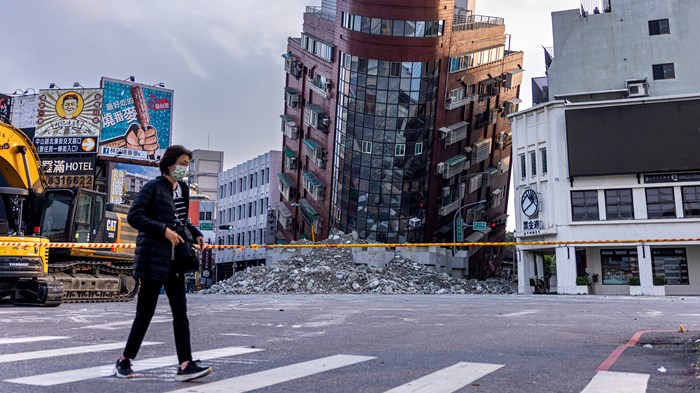
When a 7.4 magnitude earthquake hit the east coast of Taiwan Wednesday morning, Carissa Wang, branding communication director of World Vision Taiwan, was on the Taipei subway on her way to work. She felt the carriage sway more than usual, and then it stopped at the next station as an announcement alerted passengers that service had ended due to an earthquake.
Wang and her World Vision colleagues immediately began putting disaster relief protocols into action, assembling their emergency team and reaching out to local government officials to coordinate relief at evacuation centers. World Vision social workers also began to contact the 3,000 sponsored children and their families in the epicenter of Hualien to make sure they were safe and find out if they needed help.
Wednesday’s quake was the worst to hit Taiwan in 25 years, damaging buildings and causing landslides. Images from Hualien, a city on the country’s east coast, showed a red brick building leaning at a 45-degree angle after its first floor collapsed. Large rocks tumbled down the side of mountains and blocked roads into the tourist destination of Taroko Gorge, trapping people at a hotel.
Yet Hualien sustained surprisingly little damage for an earthquake of such magnitude. As of Monday, 13 people had died, and only one of them was killed due to building damage. Most of the others were hit by falling rocks. Ten people are still missing and more than 1,000 were injured.
The low loss of life is attributed to Taiwan’s earthquake preparedness, as the government improved and reinforced building codes after a deadly earthquake in 1999 killed 2,400 people. Public education on earthquakes is widespread, and disaster relief groups are well-trained and respond quickly. Buddhist Tzu Chi Charity Foundation, one of the largest philanthropic organizations in Taiwan, said that within 30 minutes of the quake, it had set up a service center to pass out blankets and emergency financial aid.
Although Christians make up less than 5 percent of the population, Christian aid groups including World Vision Taiwan, Mustard Seed Mission, and 1919 Food Bank have an outsized influence on disaster relief. The groups each have their niche and are working side by side to care for the victims. Groups like Tzu Chi and Red Cross Taiwan specialize in rescue and immediate relief, while Christian groups are more focused on caring for children and families in the impacted area, dealing with the emotional trauma of the quake, and reaching indigenous villages where they have existing relationships.
Through this collaboration, “evacuees have a place to stay, and those of us from Christian groups can accompany them and pray,” said Jeffrey Lee, CEO of Mustard Seed Mission. “Our role in this earthquake aftermath is that we seek the emotional stability of the children and the elderly.”
Working together in the shelters
After the earthquake, staff at the Hualien branch of 1919 Food Bank, part of the Chinese Christian Relief Association, drove to the most impacted area and got in touch with their government contacts. They then helped set up evacuation centers at a school, a park, and a gymnasium.
The evacuation shelters demonstrated how the relief groups worked together. Tzu Chi, which is headquartered in Hualien, quickly brought in temporary beds and set up four-walled tents without a roof to provide privacy for the evacuees. The organization came up with the idea for these privacy barriers after a magnitude 6.2 earthquake hit Hualien in 2018, killing 17. The Red Cross provided tents, food, water, and other necessities.
Due to their experience running a food bank, 1919 was tasked with collecting and distributing donated food and water as well as bringing in their mobile kitchen to make food for victims and frontline workers. Samuel Chang, director of the 1919 Food Bank, said that staff filled in wherever needed: Some helped check people in or provided power banks for people needing to charge their cell phones, while others comforted and prayed for people who arrived frightened and distraught.
In the shelters, World Vision set up children’s care centers, where staff worked to calm and distract traumatized children through activities such as singing and drawing, Wang said. They also helped watch the kids as parents returned to pack up belongings from homes deemed unsafe to live in.
Members of Mustard Seed Mission, a Christian community development nonprofit, sought to help aid workers by providing massages. Lee noted that many of them are exhausted and themselves impacted by the earthquake but because of their job, they can’t show that they’re scared. The masseuses not only relieved their physical tensions but served as friendly listeners, providing counsel and comfort.
The nonprofit has a vocational training center in Hualien, which it opened up for the government to place evacuees who need special care—for instance, the elderly or families with young children—and for whom the center’s dormitory is more comfortable than a school auditorium. Every day, Mustard Seed houses and feeds about 60 people.
Learning from Buddhist counterparts
Chang of 1919 (which in Chinese is a homophone for “need help”) observed that there are things Christian groups can learn from Tzu Chi, a group rooted in humanistic Buddhism. Master Cheng Yen, a Buddhist nun in Taiwan, founded the organization in 1966 in response to the suffering of the impoverished community where she lived. Three Catholic nuns visited Cheng, and as they discussed their religions, they asked her why Buddhists weren’t setting up nursing homes, orphanages, and hospitals if their religion teaches love and compassion for all living beings. Convicted, she began collecting donations for the poor and needy.
Today, the international humanitarian group claims to have 10 million members active in 100 countries and territories around the world, engaging in medical aid, environmental protection, and disaster relief.
In Taiwan, Tzu Chi is the most prominent relief group and are experts at what they do, said Chang. Most impressive is their ability to mobilize their members to donate and volunteer when disasters occur. He’s found that, when working alongside Tzu Chi members at a disaster site, they are always willing to take the most thankless and menial jobs—like cleaning the bathroom—whereas sometimes Christians are less willing to do so.
Chang believes the different groups complement each other well. To accommodate their religious dietary restrictions, 1919 prepares vegetarian meals for the Buddhist Tzu Chi volunteers. Tzu Chi has also invited 1919 leaders to meet with their monks to coordinate disaster response among the indigenous groups, many of whom are Christians and have closer connections to Christians organizations.
Lee agrees: “Even though we come from different faiths, in this circumstance, it’s a great match as we care for these people.”
Encountering God in the disaster
Most of the Christian groups’ work occurs outside of the immediate rescue and relief efforts, among the children and families whom they typically serve. To do that well, they often partner with the local church, which can better gauge a community’s needs, said Chang. “The church is local, they know every family and they know every neighbor’s needs,” he said.
The organization works with about 1,500 churches in Taiwan (one-third of the total number nationwide), helping to set up food banks and afterschool centers and to provide financial assistance. After the earthquake, 1919 reached out to partner churches to find needs that they can assist with. For instance, they are working on a partnership with IKEA to provide furniture to some of the earthquake victims, as well as replacing televisions or water tanks to help families return to normalcy.
“We hope that through these social services, they can see the values of our faith and the comfort that our faith can bring in their trials,” Chang said. “We hope that through the gospel and caring for their welfare, they can encounter God even in the midst of this disaster.”
World Vision and Mustard Seed both arrange sponsorships for children in impoverished communities and work in community development. World Vision staff visited their sponsored children to check the structural integrity of their homes and to determine whether repairs are needed. They found that about 180 of their families in Hualien have been impacted by the earthquake, either because the family’s home is unsafe to live in or because the parents lost their jobs.
World Vision is also involved in rebuilding the children’s confidence and security, especially since the region experienced more than 400 aftershocks following the big quake. In communities where resources are already limited, getting people back to normal life is even more important to ensure that kids stay in school and income remains stable.
“In terms of water and food, there is enough as the people of Taiwan are full of love,” Wang said. “But what we need to work on is rebuilding the homes, dealing with the children’s trauma, and quickly returning them to their ordinary lives.”
Providing aid to indigenous groups
Another focus of Mustard Seed, founded by American missionary Lillian Dickson after World War II, is on Taiwan’s indigenous people, who often live in remote mountainous areas. About 70 percent of indigenous people in Taiwan are believers, as many were receptive to the gospel shared by foreign missionaries due to the ostracism they had suffered from the Japanese and ethnic Hans in the lowlands.
After the Hualien earthquake, landslides along curving mountain roads blocked access to some of these indigenous villages. Because Mustard Seed partners with these churches, they were able to quickly find out where the needs were. On Friday, Lee said that one village told them they were running low on food and clean water, so staff loaded up a truck with 70 food packs and about 850 water bottles to deliver to them. Suddenly it started to rain, causing concern about the road conditions.
So they switched gears and decided instead to bring the aid by train. They asked the railway authorities if they could pack the goods onto the train car, and the authorities agreed. About a dozen people hauled the food packs and water onto the train, and when they reached the station near the tribal village, strangers helped them move the goods off the train. Villagers met them at the station and brought the supplies the rest of the way.
“Because we have the same Christian faith, it’s very natural for us to trust each other during this rescue process,” he said.
Long-term, all the Christian groups intend to prioritize dealing with the emotional and mental health of those affected by the quake. Many of the families in Hualien had to repair their homes after the 2018 earthquake, only to have another large-scale earthquake hit six years later, said Chang. As many live in fear of the next earthquake, he believes the church can play a role in providing counseling to locals. He’s looking for Christian counselors to go to Hualien and provide these services through the church.
Mustard Seed is seeing similar needs and also recruiting counseling students and teachers from Taiwan’s seminaries to help families in Hualien. “Even for nonbelievers, prayer and professional consultation can calm emotions after trauma,” Lee said. “We hope to provide for not only their physical needs but also for their psychological stability.”

Support Our Work
Subscribe to CT for less than $4.25/month


















